Class of 2017 alumni Abby Seeber advocates for artists on Tedx stage
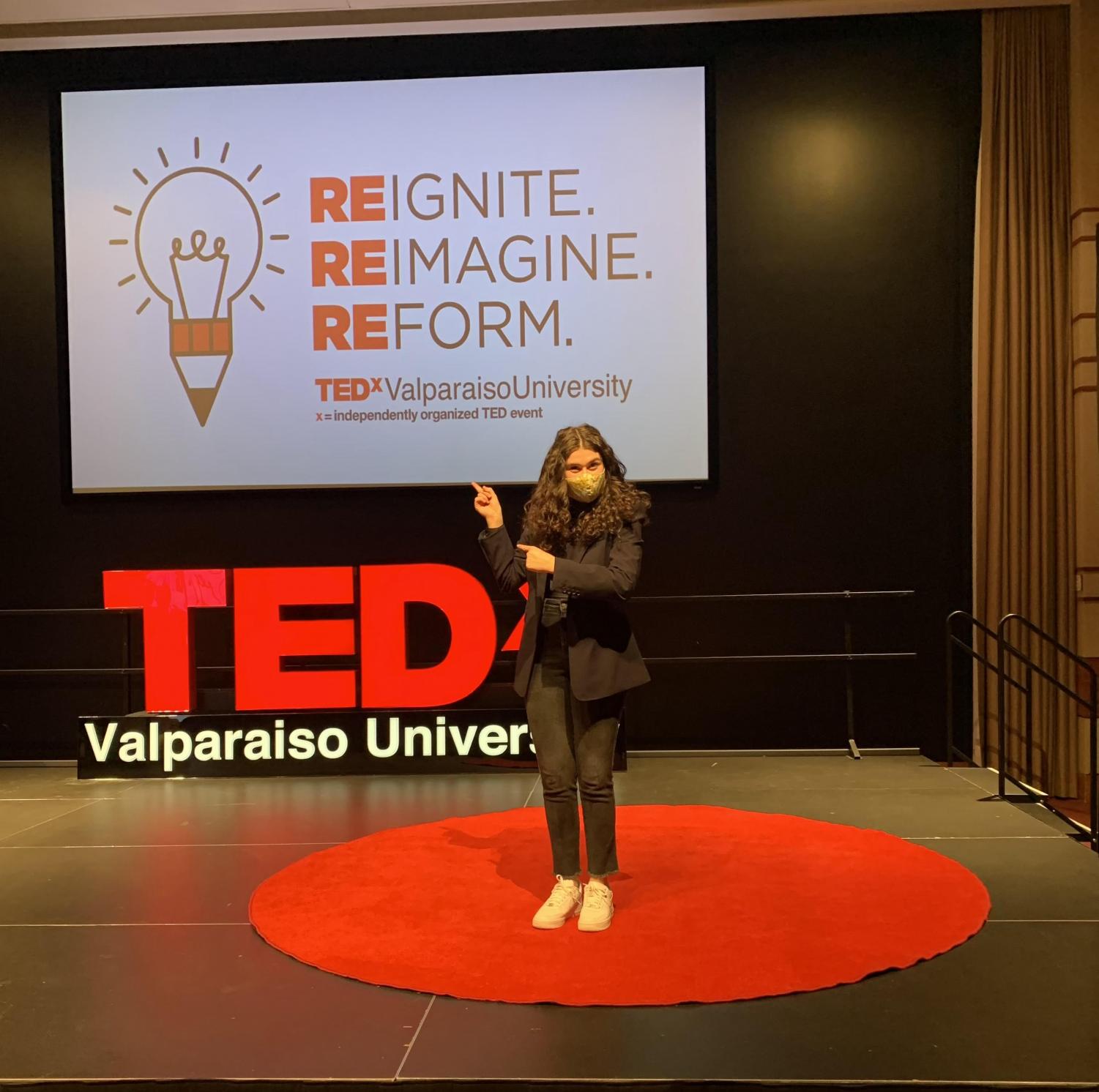
A dynamic performer and public speaker, Abby Seeber is an artist, and she’s proud to be. Despite her passion, talents, and years of experience, three words follow her everywhere:
“What’s your major?”
This question doesn’t faze Seeber, after all, she already knows what comes next. “…then I have to prepare myself to see their faces visibly drop when I say that I am a Creative Writing and Theater double major,” she muses.
Graduating from Portage Northern in 2017, Seeber is currently a Senior at Valparaiso University and nearly finished with her bachelor’s degree, yet this question still follows her. She’s constantly told her passion in life is risky simply because art and performance isn’t respected at the level of other career paths, like STEM. Daily, she notices not just the lack of recognition given to artists and creatives, but the undeniable truth that the impacts of that are now more troubling than ever.
“Our actual theater department is going through a teach out. So our current sophomores are going to continue their degree, and I get to graduate with my theater degree,” Seeber explains. “We just can’t take any more students for the time being in that major until we get more money to that department.”
Over the last year, it became rapidly apparent to Seeber that the world revolves around art and artists, but when the art industry needs protection and funding during a global crisis, there is no national advocate.
She knew what she had to do. After performing on local stages for years, she sought a national stage to spread her message. Tedx, the global stage for public speaking, was once again hosting with her university, and after extensive auditions, research, and practice, she was ready for her Ted Talk.
“I was so nervous all day, I was running through the speech, I made my friend Nick sit with me because I just kept getting the same wrong spot over and over again,” Seeber recounts. “And then the minute I stepped on stage, I was like your forensics is in here. Your improv is in here. You have your whole heart in this speech, you are not going to waste it and I just relaxed and it was there.”
Seeber reflects on her time on stage with pride and contentment: “I got it and I remembered all the lines, and it was very satisfying to feel like all the work, the rejection, the funny looks from here, it was all worth it. All of that culminated to something that I know can make some change.”
Her journey to her speaking on the TedX stage started in her freshman year at Portage Northern when she first joined the forensics team. “Freshman year, first semester, everyone was talking about forensics. So I knew I was excited. Like I knew, I enjoyed public speaking, I knew I was goofy. And I liked having it up on stage,” she remembers. “And everyone’s like, ‘You have to do forensics.’ So I realized, like, Oh, my gosh, these are my people. This is my place.”
Seeber was already a natural performer, but engaging in theater and forensics allowed to truly practice her art. “Forensics is definitely where I honed my skills and grew into them. But that instinct for performing and like speaking was there. It just wasn’t developed until forensics,” Seeber says. Her efforts with forensics and public speaking didn’t just elevate her skill, but her recognition. Her junior year, she placed 3rd in the state competition for 9 to 5. Only a year later, in duo competition, she was the state champion in alongside partner and class of 2017 alumni Stefanie Scafaria.
Seeber’s magnetic personality drew lifelong friends to her wherever she went, and one of her closest confidants is class of 2016 PN alumni Alaina Taylor. “I’ve known Abby since my senior year of high school. We actually met that year when we were both on the Northern Light staff, and were just instantly obsessed with each other. Talking with her was and still is such a mind-meld, like jumping jacks for your brain,” Taylor shares. “As I got more involved with theater, our bond grew even stronger, and now, even though we live hours and a full time zone away, she’s still one of my absolute best friends.”
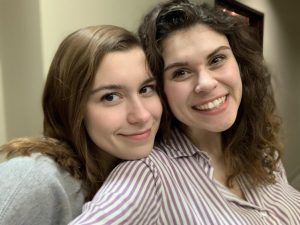
Forensics was a passion for both Taylor and Seeber, but each performer faced different challenges and growth along the way. “As a forensicator, there’s nothing I could tell Abby that she doesn’t already know and couldn’t do 8 million times better,” Taylor shares. “I joined forensics to help me get over my fear of public speaking. Abby joined forensics because she’s just an absolute natural at performing.”
Seeber also found a lifelong friend and supporter in Northern forensics coach, musical, and play producer Kristen “Bunny” Hartridge Dailey. “I will never forget the first time I truly remember her – she was riding across the stage on a desk during a rehearsal scene, and was absolutely the funniest thing on the stage that moment,” recalls Dailey. “Her physicality and sense of timing has always been spot on.”
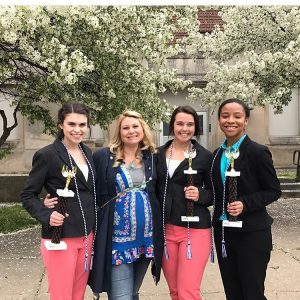
Their bond only grew from there. “Abby will always be special in my life – because of the timing of musical theatre, forensics and the plays over the past 6 years, she was in my life for my highest highs and lowest lows – she was there the night I met my husband, the night my dad died, the weeks I planned my wedding. She – and a few of the other leading ladies in our production of Into the Woods – knew I was pregnant with my daughter before most members of my family,” Dailey recalls. “She even threw me a baby shower. Since her graduation from PN we have remained parts of each other’s life, which feels incredibly special since I know how busy the world gets post-high school.”
In Dailey’s eyes, Seeber isn’t just a strong performer, she’s also a kind and considerate individual. “In her acting, forensics competitions, and stand up comedy bits at PN she was always funny but never mean – I think that is one of the marks of a true creative soul – the ability to connect in a humorous and sincere way without causing someone else discomfort,” she says.
Seeber’s road to the TedX stage was long and arduous, with her first audition occurring during her junior year of college. “I don’t think I thought it was possible. I applied last year with the same topic and didn’t get in, I applied for arts advocacy,” she explains. “But I didn’t have a fully developed idea.”
Despite the rejection, Seeber knew that this wasn’t the end of her journey. “I knew I was going to try again, I was re-energized, like, Okay, I’m going to keep trying until I get it. Then I realized I had a different argument than I did before,” she explains. “In the past, it was just like arts aren’t recognized as something as important as they are, they aren’t given the equal respect and opportunity that other opportunities are that other STEM fields are. And it’s such a worthy profession.”
While reflecting on where she wanted to take her speech, Seeber had a critical realization in the face of a global crisis. “And then all of a sudden, I looked around during COVID. And that’s all we had for each other to turn to. So I think it just reframed my argument. And kind of better positioned me to make that argument and say, we can take serious action, and there’s a way to do so that will involve government sanctioned rules to make sure that it happens rather than just a ton of people petitioning,” she explains.
Seeber shares that she never anticipated seeing herself giving a TedX speech, but she knew regardless her life would be spent spreading and advocating for artists. “The biggest thing I could think to do was the TED Talk, because I knew it wasn’t just a Valpo stage, it was a national stage.”
Luckily, Seeber wasn’t in this alone: once again she’d be working with one of her closest confidants-turned-frequent-collaborators, Alaina Taylor.
Since graduating college and working as a professional writer, Taylor wasn’t just surprised by Seeber’s idea, but excited to get to work in crafting and refining the piece. “She had a really strong vision for what she wanted to do with it, so it made my job pretty easy. It looked mostly like us sending comments back and forth in several different Google Docs, along with some FaceTime calls so we could both hear how it sounded in the format people were actually going to be experiencing it in,” says Taylor. “We had to make refinements to the speech after she initially submitted it. The team organizing the event had some specific requests about the topic and the timing of the speech that we had to reconsider, but luckily we were able to still hold true to the message she wanted to convey: arts education is formative and necessary for everyone.”
While exploring ideas for her speech, Seeber combed through the many lessons she had from professors and peers. One that stuck with her was a point in reference to properly compensating artists: “I was told by my professor the other day, the big problem is that theater artists are willing to work for free, and we shouldn’t,” she says. “We are so willing to do the thing that provides us comfort and provides us joy and that we are all we can offer to others that we’re so willing to do that we’ll do it for free or for next to no money.”
Because artists are given the privilege to do what they love, they feel pressured not to fight for compensation. This has allowed artists to be viewed as disposable or unworthy in Seeber’s perspective, and she wants to change that. “Making the profession kind of viewed as something that is not as worthy as other professions, not as worthy of full compensation, not as worthy of praise,” she affirms. “Because really, really great actors make it look like it’s easy. So everyone thinks they can do it.”
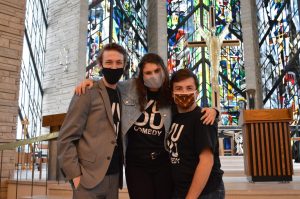
Seeber isn’t just encouraging change on a national level, but fueling the change and advocacy for art on her own college campus. “In an interview for orientation, as an orientation assistant, my interviewer asked me, ‘What do you want to see change on Valpo’s campus’, and it’s something I see everywhere,” she says. “I think we need a better diversity of intellect. There’s not enough representation of people coming from different head spaces using both their left or right brain, it’s both sides are special, both have equal value.”
Believing that change can happen with anyone, Seeber uses her extensive experience with improv to teach people to be in touch with both sides of their brain. “We did a TEDx breakout session these past two years, where they said, we’re going to teach you guys some improv at a very basic level for all our attendees. And we taught them things like the basic rules of improv, yes, and supporting your partner, don’t throw them a curveball, that kind of thing,” she explains. “We had like 40 year old women saying, ‘I’m gonna use this in the next board meeting,’ like, things like that, because they’re able to hone their skills and recognize what they’re doing.”
Seeber’s ideas resonate back home, too. “She is correct in what she said – we need an advocate on a national level. The arts were – and still are – what we lean into when we are in times of crisis or feeling a certain way,” Dailey says proudly. “That’s why music is so powerful – the right song has the ability to make anyone feel like they are recognized in an emotion at a specific moment. We do need the arts.”
Through all of the effort and hours spent on the preparation and actual delivery of the speech, there was one thing Seeber hadn’t anticipated: the supportive responses that would follow.
“I was telling my roommate this the other day, my love language is words of affirmation. So this week, I’ve been living on a high with everyone complimenting me and being like, ‘You’re just so good!’” she exclaims. “I think it’s really rewarding to see those that have doubted me be like, ‘Oh, she actually will find a way and make a way in life.’ So that is really rewarding. But at the same time, I don’t want it to be just for me.”
While Seeber might have been surprised by the response, Dailey, in her never-ending support, was not. “My reaction was complete pride,” she shares. “I never thought specifically of TED talks, but I know she will continue to do exceptional work and become more and more widely appreciated and recognized for that. What impressed me about the TED talk is that she was able to plan, research and write such a compelling and immediately important piece, and then present it in a way that was accessible to many different audiences.”
With graduation looming, Seeber has a lot to look forward to. Still, her passion remains clear: “I really just want the profession itself to be recognized as something that’s worthy of saving.”
After giving her speech on a national stage, she still knows that the lack of recognition and respect for artists still plagues her life in everyday contexts. “I work in the admissions office and one of our recent employees who just retired, he addressed me once and said, ‘Abby, what are you going to do when you graduate?’ And I said, I’m going to be a comedy writer, I stopped saying, I want to be and I just started saying I’m going to be” she explains. “So I said, I’m going to be a comedy writer, and he thought I was joking. It was like a five minute conversation where he said, ‘How are you going to make money? How are you going to do this,’ and I said, ‘I’m going to find a way, there is no way I’m going to be stuck behind a desk doing something that does not fulfill me.”
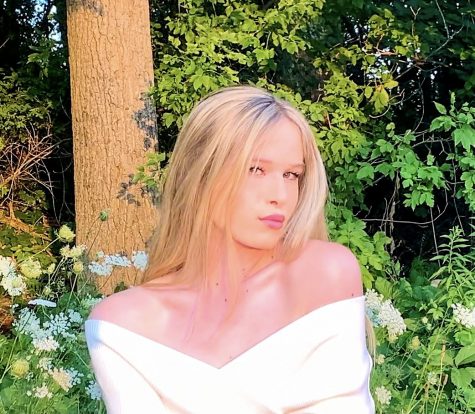
Senior Kylie Clifton is in her fourth year as a NL staff member. She is a co-editor in chief, having previously served the NL as both a business manager...




